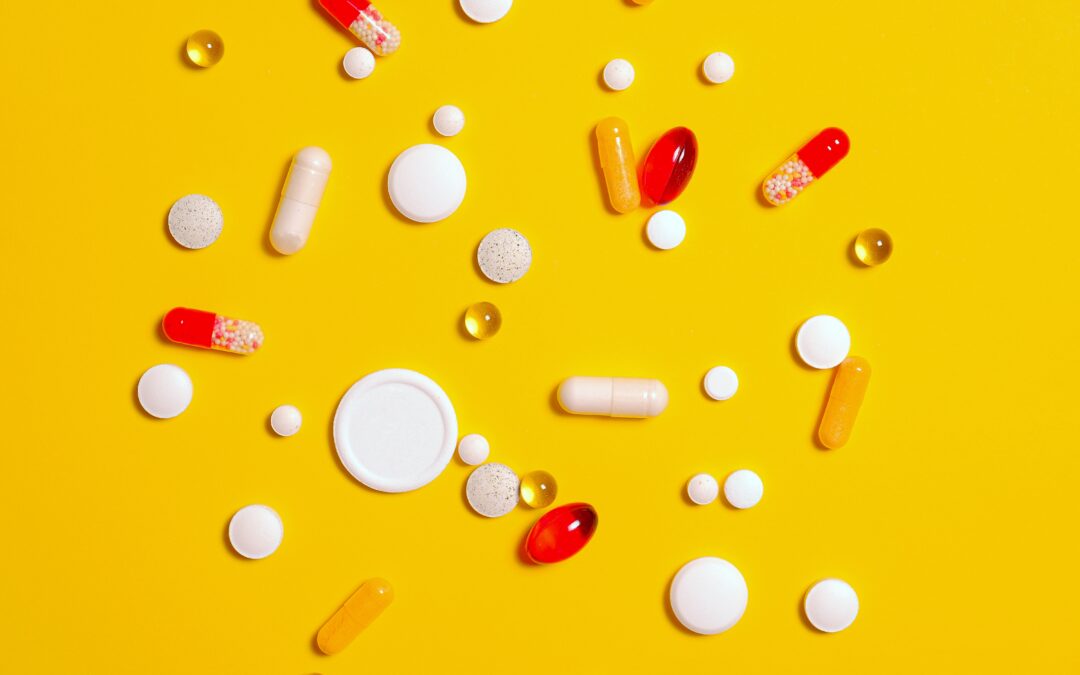Premenstrual tension syndrome, commonly known as PMS, can be a real buzz kill. Suffering month after month can really take a toll on both mental, and physical health. Symptoms like bloating, cramping, mood swings, acne, and cravings can be frustrating, and sometimes even debilitating.
There are some changes to diet and lifestyle that can alleviate the symptoms of PMS and make your monthly cycle a little more comfortable. There are also great supplements on the market to ease some uncomfortable symptoms!
What is PMS?

PMS, or premenstrual syndrome, refers to a collection of physical, emotional and behavioural symptoms that are experiences in the days leading up to a menstrual period. A recent study shows that approximately 80-90% of women experience at least one PMS symptom during their reproductive years.
Common symptoms of PMS include mood swings, irritability, breast tenderness, food cravings, bloating, fatigue, and headaches. The intensity varies among individuals, and usually subsides once menstruation begins.
What Worsens PMS Symptoms?
There are several factors that may contribute to worsening symptoms prior to menstruation.
- High Stress: High levels of stress can worsen PMS symptoms due to the rise in cortisol.
- Poor Diet: A poor diet can lead to nutritional deficiencies, inflammation, and imbalanced hormones, all of which can exacerbate PMS symptoms.
- Lack of Exercise: A sedentary lifestyle may worsen PMS symptoms. Exercise is encouraged to balance hormones, fight inflammation, and improve blood flow.
- Lack of Sleep: Poor quality sleep, or inadequate sleep, can throw off hormonal harmony.
- Caffeine and Alcohol: Overconsumption of caffeine and alcohol has been linked to worsened PMS symptoms.
My top 6 supplements for pms:

In addition to lifestyle and diet intervention, there are many supplements for pms that can alleviate uncomfortable symptoms. Here are a few of my top supplements:
- B Vitamins
- Magnesium
- Turmeric
- Probiotics
- Omega 3 Fatty Acids
- Calcium
B Vitamins
B vitamins are commonly for PMS, especially vitamin b6. B Vitamins are needed to synthesize hormones, which is why they may improve overall hormonal balance and reduced pms symptoms. B vitamins also play a great role in liver detoxification and detoxing excess estrogen from the body. Estrogen dominance (or excess estrogen) is a common culprit behind PMS symptoms. Lastly, B vitamins are essential when it comes to coping with stress. They support our adrenals and may regulate cortisol levels. Less cortisol may improve pms symptoms.
Magnesium
Magnesium supplements are widely known to reduce premenstrual symptoms, and personally are my go-to when it comes to preventing menstrual cramps among my clients. Magnesium can be quite effective in lowering prostaglandin production, which are hormone like substances that cause cramping. Magnesium also acts as a muscle relaxant and can help calm down uterine cramping prior to, and during menstruation. Moreover, magnesium has been shown to help balance mood and relax the central nervous system leading to less irritability and a sense of calmness.
Turmeric
Turmeric, a spice commonly used in cooking and traditional medicine, is believed to have potential benefits for PMS symptoms due to its anti-inflammatory properties. Since PMS symptoms can be associated with elevated inflammation in the body, taking turmeric has been shown to improve mood, lessen cramping and fatigue, optimize sleep, manage bloating and so much more! Moreover, turmeric has been shown to help regulate neurotransmitters like dopamine and serotonin which are involved in mood balance.
Probiotics
Probiotics are beneficial bacteria that can have a positive effect on our gut, and overall health. There are several reasons that probiotics may be responsible for managing PMS. Firstly, probiotics play a role in hormone metabolism and directly influence estrogen levels, therefore a healthy gut may lead to healthy estrogen levels. Moreover, since it has been shown that a lot of systemic inflammation begins in our gut, it is crucial we take care of it! Improving gut health can have a direct relationship on overall inflammation. The less inflammation we have, the less severe our PMS symptoms are. Lastly, probiotics are responsible for keeping us regular! Once your liver is done processing hormones, we need to poop those out! Imbalances in the microbiome can lead to constipation, which may cause estrogen to be reabsorbed leading to excess levels of this hormone.
Omega 3 Fatty Acids
Omega 3 fatty acids are widely known as an anti-inflammatory supplement. Managing inflammation is crucial when it comes to PMS. Since higher systemic inflammation can worsen menstrual cycle symptoms, it is common to feel a reduction in these unwanted symptoms when taking this supplement. Moreover, Omega 3 has been shown to reduce cramping by managing prostaglandin production, which is the number one cause of menstrual cramping. Lastly, this supplement can balance mood which can feel imbalanced around the time of menstruation.
Calcium
Calcium supplements play a crucial role in many bodily functions, some that may directly impact the severity of PMS. Let’s begin with mood. Calcium has been shown to have a positive effect on mood regulation and emotional well-being. Adequate calcium has been shown to improve mood prior to menstruation. Moreover, calcium has been shown to regulate fluid balance within the body leading to less bloating, cramping, breast tenderness, and muscle cramps. Lastly, calcium is involved in the regulation of hormones like estrogen and progesterone which are associated with pre menstrual symptoms. Since calcium can help to balance these hormones, typically there is an improvement in symptoms experienced.
Looking for other ways to manage PMS? Book in for a complimentary consultation and let’s get you started on your hormone journey today! Click here to book directly into my schedule!
Frequently Asked Questions about PMS:
Is there a difference between PMS and PMDD?
Yes! PMDD (premenstrual dysphoric disorder) is a much more severe form of PMS. It affects a smaller percentage of women. PMS is not always debilitating and may not impact daily functioning, whereas PMDD symptoms are much more intense and significantly impact daily function.
Can PMS symptoms vary from cycle to cycle?
Absolutely! PMS symptoms are greatly affected by diet and lifestyle; therefore, they can vary from month to month. Some cycles may have milder symptoms, while others are more pronounced. You may be able to notice trends with symptoms and stress levels!
Does PMS stop after menopause?
For most women, PMS symptoms improve after menopause. Many women going through the menopausal transition will notice other hormonal symptoms such as insomnia, hot flashes and weight gain due to lower estrogen and progesterone levels.
When should I consult a healthcare professional about PMS?
If your PMS symptoms interfere with your daily life, it is advisable to consult a healthcare practitioner for guidance and treating pms. Your menstrual cycle should not significantly interfere with your psychological or physical well-being on a monthly basis. There are many ways to make this monthly cycle more seamless.

Written by Allison Sherkin, RHN, CHNC
Allison is a registered holistic nutritionist and leading women’s health expert. She has years of experience and expertise in weight loss, hormonal balance, and digestion.


Recent Comments